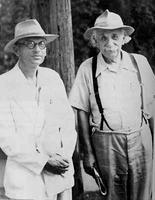
One of Einstein’s closest friends was Kurt Gödel, the logician who worked alongside Einstein at Princeton’s Institute for Advanced Studies from 1940 to 1955, the year Einstein died. In his EinsteinFest lecture yesterday afternoon, John Dawson provided a comparison and contrast between the two men (Companion Stars: Einstein and Gödel at the Institute for Advanced Study).
Gödel is much less well known that Einstein, unless you work in mathematics or philosophy. But his Incompleteness Theorem, along with Heisenberg’s Uncertainty Principle and Einstein’s work in Relativity Theory have changed they way we look at the universe, from the quantum level to the origins of the universe to, in Gödel’s case, the confidence we have in systems of thought. The Incompleteness Theorem states that within any branch of mathematics, there will always be some propositions that cannot be proven either true or false given the rules and axioms of that branch itself. Those same propositions might be provable one way or the other outside that branch, but then you are faced with a new set of propositions whose truth or falsity cannot be proved within that system.
This impacts the field of artificial intelligence. Some have argued that we will never be able to create a computer that is more intelligent that the human brain simply because of Gödel’s Incompleteness Theorem. In other words, computers operate according to a set of axioms given to it. The computer, it is argued, cannot discover new truths outside that set of axioms, even though that is precisely how the human brain operates; that is, by opening itself to a broader, newer set of axioms.
Another metaphorical analogue suggests that humanity will never be able to fully understand our own minds or brains (see Douglas Hofstadter’s Gödel, Escher, Bach: An Eternal Golden Braid). Just as we cannot see our faces with our own eyes, we will never be able to mirror completely our symbolic structures of thought. Why? We can never truly stand outside ourselves which is the prerequisite to do so.
Whether or not the speculations about Artificial Intelligence prove founded, the philosophical implications of the work of one of Einstein’s colleagues may be with us for as long as we speak about Relativity Theory.

No comments:
Post a Comment